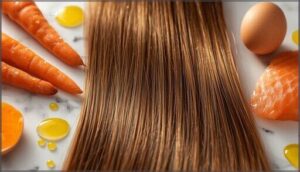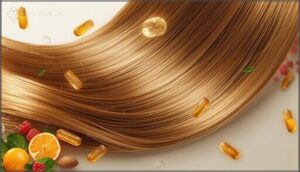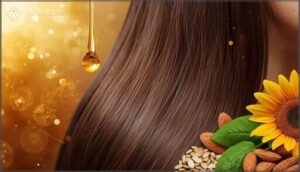This site is supported by our readers. We may earn a commission, at no cost to you, if you purchase through links.
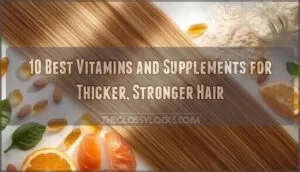
Here’s where targeted vitamins and supplements for hair thickness step in, offering a science-backed route to stronger, denser strands. From collagen peptides that rebuild keratin structure to omega-3s that calm scalp inflammation, the right nutrients can shift your hair from fragile to resilient.
We’ll break down which supplements deliver real results, what dosages matter, and how to match them to your specific needs.
Table Of Contents
- Key Takeaways
- Essential Vitamins for Hair Thickness
- Key Minerals Supporting Hair Growth
- Popular Supplements for Thicker Hair
- Top 10 Supplements for Hair Thickness
- 1. hair growth biotin supplement gummies
- 2. Nutrafol hair growth supplements for women
- 3. Biotin for Hair Skin and Nails
- 4. Viviscal Women Hair Growth Vitamins 30 Day
- 5. Vitafusion Multivitamin Gummy Beauty Hair Skin Nails
- 6. Womens Daily Multivitamin Softgels Supplement
- 7. Nature’s Bounty Hair Skin Nails
- 8. Biotin Collagen Hair Skin Nails Supplement
- 9. Nature’s Bounty Hair Growth Vitamins
- Recognizing Signs of Vitamin Deficiency
- Most Common Nutrient Gaps Linked to Hair Loss
- Choosing The Right Supplement for You
- Evidence and Safety of Hair Growth Supplements
- Frequently Asked Questions (FAQs)
- Do supplements and vitamins work to thicken hair?
- Is it possible to speed up hair growth?
- Which vitamin deficiency causes hair loss?
- Does biotin work for hair growth?
- How do you use rosemary oil for hair growth?
- Which vitamin makes your hair thicker?
- Which supplement is good for thin hair?
- How can I increase the thickness of my hair?
- How long until supplements show results?
- When should I stop taking hair supplements?
- Conclusion
Key Takeaways
- Hair thinning often stems from measurable nutrient deficiencies—low ferritin, vitamin D, or biotin—rather than genetics alone, making targeted supplementation a science-backed route to thicker strands when you’re actually deficient.
- Clinical trials show specific supplements like marine collagen, omega-3s, and biotin (when deficiency exists) can increase hair density by 10–30% within three to six months, but results depend on addressing your actual gaps, not blanket supplementation.
- The most common nutrient shortfalls linked to hair loss are iron (affecting 22–35% of women with thinning), vitamin D (35% of adults), zinc (20%), and B12 (up to 20%)—often appearing together and compounding follicle stress.
- Supplements work best when matched to blood-test-confirmed deficiencies and sustained for 90–180 days, since hair follicles cycle slowly and won’t respond to nutrients you’re not missing or products you abandon too quickly.
Essential Vitamins for Hair Thickness
Your hair’s thickness depends on more than just genetics—it needs specific vitamins to thrive. Some nutrients strengthen each strand, while others keep your follicles cycling properly through their growth phases.
Let’s look at the five essential vitamins that directly impact how thick and strong your hair can become.
Vitamin a – Benefits and Risks for Hair
Regarding hair health, vitamin A is both a friend and a potential foe. Your hair follicles need this nutrient for proper cell turnover and sebum production, but the line between too little and too much is surprisingly narrow.
Here’s what vitamin A does for your hair:
- Fosters stem cell activity in follicles, promoting consistent hair cycling and new growth
- Promotes strong keratin production for resilient strands that resist breakage
- Helps maintain scalp moisture through healthy sebum synthesis
- Protects follicles from oxidative stress as a natural antioxidant
- Can extend the growth phase when used in retinol hair growth treatments
Vitamin A sources like eggs, dairy, and fish usually provide enough without risk. But high-dose supplements can trigger toxicity hair loss—often appearing as sudden, uniform thinning. Safe intake levels sit around 700–900 micrograms daily for adults.
Both deficiency hair effects and overconsumption cause shedding, though both reverse once you normalize your levels. If you’re experiencing hair loss alongside nutrient deficiencies, check your vitamin and mineral intake before adding more supplements. It also plays a key role in hair follicle function, which is essential for hair growth.
B-Complex Vitamins (Biotin, Folate)
While vitamin A keeps your follicles functional, B-complex vitamins are the workhorses behind the actual metabolic machinery that builds each strand of hair. Biotin and folate support cell division in rapidly growing follicles, though biotin benefits only emerge when you’re actually deficient. B-complex synergy means these vitamins work together—folate absorption boosts DNA synthesis while biotin strengthens keratin structure.
| Vitamin | Primary Role | Deficiency Symptoms |
|---|---|---|
| Biotin (B7) | Keratin infrastructure | Brittle hair, thinning |
| Folate (B9) | DNA synthesis, cell division | Premature graying, slow growth |
| B12 | Red blood cell formation | Hair loss, fatigue |
| Niacin (B3) | Scalp circulation | Dullness, breakage |
| Riboflavin (B2) | Energy metabolism | Seborrheic dermatitis |
Most people get enough B-complex vitamins through diet, so supplements help primarily when digestive issues or restrictive eating patterns create gaps in hair follicle metabolism.
Vitamin C – Antioxidant and Collagen Support
Beyond building hair structure, your scalp needs protection from the oxidative stress that weakens follicles and breaks down the collagen scaffolding around each strand—and that’s exactly where vitamin C steps in. As a powerful antioxidant, it neutralizes free radicals while driving collagen synthesis, directly supporting follicle integrity and hair shaft strength.
The benefits of vitamin C for hair health extend beyond supplements—citrus fruits, bell peppers, and berries provide abundant dietary sources. Absorption factors matter: pairing vitamin C with iron-rich foods boosts iron uptake, addressing another common driver of thinning hair.
Vitamin D – Role in Hair Follicle Cycling
If collagen gives your hair its structural foundation, think of vitamin D as the conductor orchestrating when each follicle wakes up, grows, and eventually rests—because without adequate levels, that entire cycle can stall out. Vitamin D receptors are embedded throughout your hair follicle, regulating the growth phase directly.
Deficiency prevalence hits roughly 40% of Americans, and it’s linked to conditions like alopecia areata and diffuse hair thinning. When your vitamin D drops too low, follicles can prematurely shift into a dormant state, shortening growth windows and thinning your overall hair density.
Vitamin E – Impact on Hair Count and Strength
Your body relies on vitamin E to shield follicles from the oxidative damage that quietly sabotages hair strength long before visible thinning begins. Here’s what the research shows:
- Antioxidant properties neutralize free radicals attacking your scalp
- Scalp circulation improves, delivering nutrients to each follicle
- Hair follicle protection guards against environmental stressors
- Ideal dosage of 100 mg daily increased total hair count by significant margins in controlled trials
Combination therapies pairing vitamin E with other antioxidants often outperform single-nutrient supplements for measurable improvements in hair health and nutrition.
Key Minerals Supporting Hair Growth
While vitamins often steal the spotlight, minerals work behind the scenes to build the foundation for healthy hair growth. Your body relies on specific minerals to keep follicles functioning and prevent thinning before it starts.
Let’s look at the key players that deserve a spot in your hair care routine.
Iron – Preventing Hair Loss From Deficiency
When ferritin drops below 30–40 ng/mL, hair shedding often accelerates as follicles prematurely enter telogen effluvium. Iron is essential for follicle function, and deficiency appears in 59% of women with nonscarring hair loss. A ferritin level of 15 ng/mL indicates moderate-to-severe deficiency.
Oral supplementation—usually 65–130 mg elemental iron daily for 3–6 months—restores ferritin and maintains regrowth. Pairing dietary iron with vitamin C boosts absorption, while excess intake risks toxicity. Testing ferritin levels helps pinpoint anemia and vitamin and mineral deficiencies driving your hair loss.
Zinc – Correlation With Hair Thinning
Low serum zinc consistently shows up in patients with alopecia areata, and that connection isn’t coincidental—zinc plays a structural role in keratin formation and follicle cell division. When zinc deficiency goes unchecked, hair thinning accelerates.
Consider these zinc supplementation strategies:
- Daily dose: 15–30 mg elemental zinc restores serum zinc without toxicity
- Testing first: Check levels before supplementing to confirm deficiency
- Timeline: Hair regrowth usually emerges after 3–6 months of consistent use
Zinc targets one of the most treatable hair loss causes linked to vitamin and mineral deficiencies.
Other Minerals (Magnesium, Selenium)
Beyond iron and zinc, magnesium and selenium work behind the scenes to keep your hair follicles firing on all cylinders. Magnesium benefits protein synthesis in every strand, while selenium deficiency disrupts antioxidant defense at the scalp level.
You’ll find selenium in Brazil nuts and fish, magnesium in leafy greens and seeds. Mineral interactions matter—balance your mineral supplements rather than mega-dosing one nutrient, and address vitamin and mineral deficiencies holistically for the best results.
Popular Supplements for Thicker Hair
You’ve already covered the vitamins and minerals your hair needs.
Now let’s look at the specific supplement formulas that combine these nutrients into ready-to-take options. We’ll break down which types work best and what the research actually shows about their effectiveness.
Biotin – Efficacy and Target Users
Biotin only works if you’re actually missing it—think of it as fuel for a car that’s already full. Clinical evidence confirms that biotin supplementation improves hair thickness in people with deficiency or specific metabolic disorders, not in those with normal vitamin B7 levels.
Who benefits most from biotin:
- People with confirmed deficiency showing brittle nails, seborrheic dermatitis, or hair loss due to medications like valproic acid or isotretinoin
- Those with enzyme disorders requiring high-dose biotin (10,000–30,000 µg/day) to maintain normal metabolism
- Patients on prolonged antibiotics or anticonvulsants that deplete biotin stores
Standard biotin dosage ranges from 30–100 µg/day for general health, though hair growth supplements often contain 2,500–10,000 µg. Supplement safety is excellent—no serious adverse effects reported up to 300 mg/day—but high doses can interfere with blood tests. If you don’t have a deficiency confirmed through testing, biotin likely won’t deliver the thicker hair you’re hoping for.
Marine Collagen-Based Formulas
Marine collagen supplements pull double duty—they provide the building blocks your hair follicles need while simultaneously reducing the oxidative stress that weakens each strand. Clinical evidence shows these marine sources deliver smaller peptides that improve collagen absorption more efficiently than bovine alternatives.
Formulas combining marine collagen with essential nutrients for hair—zinc, vitamin C, biotin—demonstrated measurable formula efficacy in controlled trials, with participants reporting thicker hair and less shedding within six months. The role of vitamins and minerals amplifies collagen’s impact, addressing nutrient deficiencies while supporting keratin synthesis from within.
Omega-3 Fatty Acids for Hair Density
Your hair follicles thrive on healthy fats, and omega-3 fatty acids—particularly EPA and DHA from fish oil—nourish the scalp while reducing inflammation that can stunt hair growth. Clinical evidence shows these essential nutrients for hair improve density when combined with other supplements, addressing nutrient deficiencies linked to thinning.
Common omega-3 sources include fatty fish and algae-based supplements. Dosage guidelines usually recommend 1,000–2,000 mg daily to support scalp inflammation reduction and get the most out of diet on hair health.
Multivitamins Vs. Single-Nutrient Supplements
Once you’ve identified which nutrients work for your hair, you’ll need to decide whether a multivitamin or a single-nutrient supplement makes the most sense for your goals. Multivitamins offer nutrient synergy and convenience, while single supplements provide dosage control for targeted needs.
If you’re addressing specific vitamin and mineral deficiencies impacting your hair—like low iron or zinc—isolated dietary supplements work best.
For general support, combination vitamin supplements balance cost comparison and absorption rates, helping you maintain consistent hair growth without guessing which nutrients you’re missing.
Top 10 Supplements for Hair Thickness
Now that you know which vitamins and minerals support hair health, let’s look at specific products that deliver these nutrients.
The following ten supplements have been formulated to target hair thickness and strength, each bringing different combinations of key ingredients to the table.
Here’s what made our list.
1. hair growth biotin supplement gummies
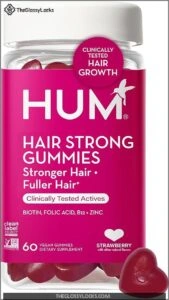
These chewy vitamin B7 gummies combine biotin—often 2,500 to 10,000 mcg—with zinc, folic acid, and B12 to fuel keratin production and support hair strength. A 2024 trial showed a 10.1% density boost after six months in women using biotin gummies daily, compared to a 2% drop in the placebo group.
The global market is soaring toward $3.29 billion by 2035, fueled by social-media buzz and subscription models. While high biotin dosage is safe for most, it can skew thyroid lab results.
Research gaps remain: most studies focus on self-perceived thinning rather than clinical alopecia, and benefits appear strongest when you’re actually deficient.
Best For: Anyone dealing with thinning hair or slow growth who wants an easy, tasty way to support stronger strands—especially if you suspect you might be low on biotin.
- Clinically shown to boost hair density by over 10% in six months, with less shedding and shinier results
- Packed with biotin plus zinc, folic acid, and B12 to support keratin production and overall hair health
- Convenient gummy form that’s gluten-free and vegetarian-friendly, making it simple to stick with daily
- Taste can be off-putting for some users, with complaints about an unpleasant or “disgusting” flavor
- High biotin doses may mess with lab tests like thyroid panels, so let your doctor know if you’re taking them
- Most research focuses on women with self-reported thinning rather than diagnosed hair loss, and long-term effects beyond six months aren’t well studied
2. Nutrafol hair growth supplements for women
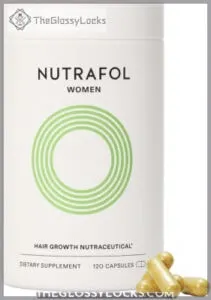
Nutrafol blends 21 botanicals and nutrients—saw palmetto, ashwagandha, marine collagen, tocotrienols—targeting DHT, inflammation, and stress-related shedding. A six-month trial showed 90% of women reported visible improvement, with measurable hair-count gains by 90 days.
Clinical studies note no serious side effects in most participants, though one liver-injury case report and occasional bloating suggest you should consult your doctor first. Dosage timing is simple: four capsules daily, but results hinge on consistent use for three to six months.
User experiences often echo the data—thicker strands and less fallout—but the $88 monthly price and manufacturer-funded trials mean independent validation remains sparse.
Best For: Women ages 18-44 experiencing thinning hair due to stress, hormonal changes, or nutritional gaps who can commit to 3-6 months of daily use.
- Clinical trials show 90% of women saw visible improvement after 6 months, with measurable hair-count increases as early as 90 days
- Targets multiple root causes—DHT, inflammation, stress—with 21 botanicals including saw palmetto, ashwagandha, and marine collagen
- Generally well-tolerated with no serious adverse events reported in most clinical studies
- Expensive at $88 per month, and some users find it cheaper on other platforms
- Results require patience and consistent daily use for 3-6 months before noticeable improvements
- Most studies were manufacturer-funded with small sample sizes, plus one documented case of severe liver injury raises caution for pre-existing conditions
3. Biotin for Hair Skin and Nails
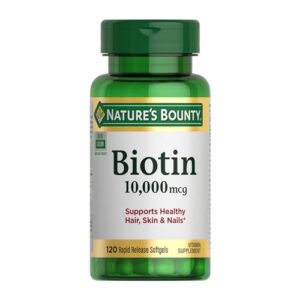
When laboratories flag false abnormal results—a known quirk of high-dose biotin—you know this supplement has jumped from niche nutrient to mainstream staple. At 10,000 mcg per softgel, Nature’s Bounty delivers well above the 30 mcg daily requirement, which can strengthen brittle nails and reduce hair loss if you’re genuinely deficient.
Clinical evidence confirms biotin benefits only materialize in people with underlying deficiency symptoms like thinning hair or skin rash, not in healthy adults. Side effects remain rare—mild stomach upset or rash—and supplement safety data show no confirmed toxicity even at extreme doses.
Best For: People with confirmed biotin deficiency experiencing hair thinning, brittle nails, or skin issues who need a high-potency supplement.
- High 10,000 mcg dose effective for those with genuine deficiency or underlying conditions causing hair loss and weak nails.
- Rapid-release softgels designed for easy absorption and gluten-free formulation suitable for most users.
- Generally safe with no confirmed toxicity cases, even at extremely high doses, and excess is naturally excreted.
- No proven benefit for healthy individuals without biotin deficiency—most people won’t see results.
- High dosage can interfere with lab tests, causing false readings for thyroid and cardiac markers.
- Some users report quality control issues like unsealed containers, plus potential side effects including rash or stomach upset.
4. Viviscal Women Hair Growth Vitamins 30 Day
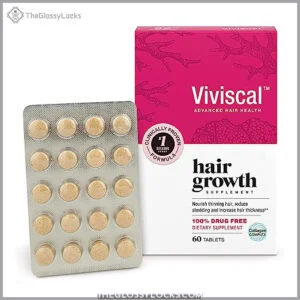
Among the handful of supplements with clinical hair growth backed by placebo-controlled trials, Viviscal stands out. Its AminoMar complex—a marine collagen blend—increased terminal hair count from 189 to 341 over six months in one study, while hair diameter thickened from 0.060 to 0.067 mm. The user satisfaction rate hit 83%, with significant gains in scalp coverage.
Since 1992, Viviscal safety profile data show only mild stomach upset. Two tablets daily for three months deliver 120 mcg biotin, 59 mg vitamin C, and 10 mg iron—targeting both vitamin deficiency and mineral deficiency tied to hair loss.
This market positioning as a clinical-grade option explains why dermatologists recommend it for diffuse thinning.
Best For: Women experiencing hair thinning or loss who want a clinically proven supplement with marine collagen and vitamins that delivers visible results in 3–6 months.
- Clinical trials show real hair growth—terminal hair count nearly doubled (189 to 341 hairs) in six months, with thicker strands and improved scalp coverage.
- Contains AminoMar marine complex plus biotin, vitamin C, iron, and zinc—targeting nutrient deficiencies linked to hair loss.
- 30 years on the market with a solid safety record and 83% user satisfaction, backed by dermatologist recommendations.
- Not suitable for anyone with seafood allergies, and off-limits for pregnant or nursing women due to marine-based ingredients.
- Some users report mild side effects like nausea, dizziness, or stomach upset, though severe reactions are rare.
- Results require consistent use for 3–6 months, and it’s pricier than basic multivitamins—may not work for everyone.
5. Vitafusion Multivitamin Gummy Beauty Hair Skin Nails
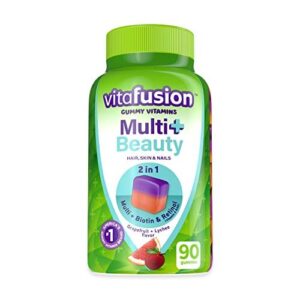
Gummy bioavailability is a selling point for Vitafusion, but label discrepancies and dosage concerns deserve your attention. Three gummies deliver 6,200 mcg of biotin—over 200 times the daily need—plus 8,460 IU of vitamin A, which exceeds recommendations and can trigger hair loss when oversupplied. Testing found ingredient mismatches beyond 20% in some supplements for hair growth.
Still, consumer satisfaction averages 4.7/5 across 848 reviews, driven partly by marketing influence and celebrity endorsements. The formula promotes vitamins for skin health and tackles gaps, but clinical proof for thicker hair remains thin.
Best For: Women seeking a convenient gummy alternative to traditional multivitamins who want support for hair, skin, and nail health but should watch out for high biotin and vitamin A levels.
- High consumer satisfaction with 4.7/5 rating from 848 reviews, and gummy format makes it easier to take than pills.
- Contains 6 times more vitamin C and double the vitamin E of typical multivitamins, supporting antioxidant protection and collagen production.
- Passed heavy metal screening and stays below California Prop 65 safety limits for toxic contaminants.
- Delivers 6,200 mcg of biotin (200x daily need) which can interfere with lab tests for thyroid and cardiac function, and 8,460 IU of vitamin A that exceeds recommendations and may trigger hair loss.
- Label testing found ingredient discrepancies over 20% in some vitamins, raising concerns about accuracy and potency.
- Lacks pregnancy warnings despite high vitamin A levels that pose teratogenic risks, and clinical evidence for hair growth remains limited.
6. Womens Daily Multivitamin Softgels Supplement
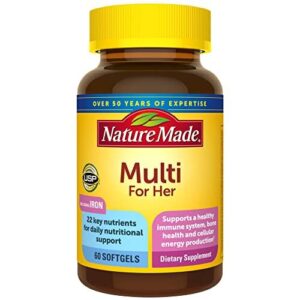
Most women’s daily multivitamins pack 23–27 nutrients into a single softgel, but Nutrient Absorption sets this format apart. Fat-soluble vitamins like D3 and E absorb better through softgels than tablets, and the vitamin and mineral impact on hair becomes measurable after consistent use.
One Clinical Trials study showed a 43.7% jump in vitamin D and a 52% rise in folate after 12 weeks—two nutrients directly tied to reducing hair loss. Dosage Guidelines recommend one softgel daily with food to prevent nausea. The Safety Profile is solid: fewer than 8% of users report mild stomach upset.
Your diet alone may not fill every gap, so targeted supplementation through supplements for hair growth can bridge deficiencies that stall follicle function.
Best For: Women looking to fill nutritional gaps with a comprehensive multivitamin that supports bone health, immune function, and hair strength through 22+ essential nutrients in an easy-to-absorb softgel format.
- Softgel format enhances absorption of fat-soluble vitamins (A, D, E, K) better than tablets, with clinical studies showing a 43.7% increase in vitamin D and 52% boost in folate after 12 weeks of consistent use.
- USP verified and gluten-free formulation delivers 18 mg iron and 25 µg vitamin D3 per serving, addressing common deficiencies that contribute to hair thinning and low energy in women.
- Strong safety profile with fewer than 8% of users reporting mild side effects, plus clinical trials showed over 40% increase in terminal hair count after 90 days among women with self-perceived thinning.
- Some users find the product expensive compared to standard multivitamins, and the softgels have a slight odor that may be off-putting.
- May cause minor stomach discomfort in sensitive individuals, particularly when taken without food or on an empty stomach.
- Contains additional inactive ingredients that some consumers wish were removed, and poses accidental overdose risks for children under 6 due to iron content.
7. Nature’s Bounty Hair Skin Nails
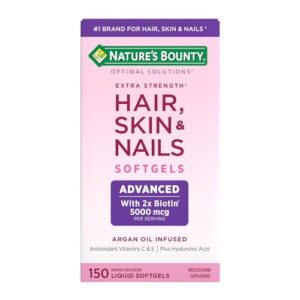
Nature’s Bounty Hair Skin Nails delivers 2,500 mcg of biotin per serving—833% of your daily value—alongside vitamin C and E for antioxidant support. Product Efficacy hinges on consistent supplementation over several months, not overnight results.
Ingredient Analysis shows the formula excludes gluten, soy, and artificial flavors, yet includes gelatin, so it won’t suit vegans. Customer Reviews praise improvements in nail strength and hair texture, though some report sticky gummies or mild stomach upset.
The Safety Profile is solid: USP-certified manufacturing meets FDA standards. Market Comparison reveals this dietary supplement costs roughly $10–12 per bottle, making it one of the most affordable options targeting hair loss and thinning.
Best For: Anyone seeking an affordable, biotin-rich supplement to support hair growth, nail strength, and skin health without artificial additives.
- High biotin content (2,500 mcg per serving) plus antioxidant vitamins C and E at a budget-friendly $10–12 per bottle, making it one of the most cost-effective beauty supplements available.
- USP-certified manufacturing ensures quality standards, and the formula is free from gluten, soy, artificial flavors, and common allergens.
- Customer reviews consistently report noticeable improvements in nail strength and hair texture after several months of use.
- Not vegan-friendly due to gelatin content, and some users report gummies arriving stuck together or having an unpleasant texture.
- High biotin levels can interfere with medical lab tests, potentially causing false results in immunoassays, so consult your doctor before starting.
- Results require months of consistent use rather than quick fixes, and some people experience mild stomach upset when taking on an empty stomach.
8. Biotin Collagen Hair Skin Nails Supplement
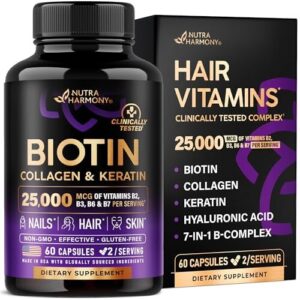
Biotin collagen hair skin nails supplement pairs 25,000 mcg of biotin with collagen peptides, keratin, and hyaluronic acid—a powerhouse stack for deficiency correction. Clinical evidence shows similar formulas reduced hair shedding by 99% and boosted hair density by 30 units after 90 days.
Dosage considerations matter: 25,000 mcg exceeds therapeutic ranges for brittle nails but targets inherited biotin deficiencies effectively. Market trends reveal these combos dominate esthetic supplementation, yet most benefits surface only when you’re filling a real nutrient gap.
Supplement interactions are rare, though high biotin can skew lab tests for thyroid and cardiac markers.
Best For: People with biotin deficiency or brittle nails looking for a high-dose supplement stack to support hair, skin, and nail health over 90+ days.
- Contains 25,000 mcg biotin plus collagen, keratin, and hyaluronic acid in a comprehensive formula that addresses multiple esthetic concerns simultaneously.
- Clinical evidence shows similar formulations reduced hair fall by 99% and increased nail growth by 40% after 90 days of consistent use.
- Made in the USA with a gluten-free, non-GMO formula at a reasonable price point of $27.99.
- High biotin dose can interfere with lab tests for thyroid and cardiac markers, requiring you to inform your doctor before bloodwork.
- Most documented benefits occur in people with existing deficiencies—results may be minimal if you already have adequate nutrient levels.
- May cause unwanted hair growth in areas beyond the scalp, and results typically take several months to become noticeable.
9. Nature’s Bounty Hair Growth Vitamins
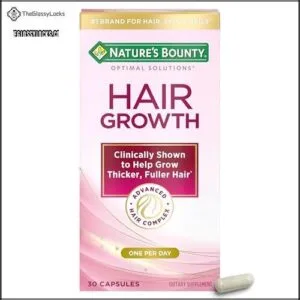
Advanced Hair Complex from this 50-year-old brand delivers arginine silicate inositol with 10 mg silicon plus magnesium biotinate—a refined formula backed by clinical evidence.
One placebo-controlled trial documented terminal hair count jumping from 271 to 571 after 90 days (p Your hair follicles signal nutrient deficiencies long before visible thinning begins
Let’s look at the warning signs you shouldn’t ignore and which nutrient gaps are most likely sabotaging your hair thickness.
Recognizing Signs of Vitamin Deficiency
Your hair can tell you what’s happening inside your body long before a blood test does—if you know how to read the signs. When vitamin deficiencies start taking root, your scalp and strands broadcast early symptoms worth noting:
- Thinning patches or diffuse shedding across your scalp, often tied to iron or vitamin D shortfalls
- Brittle, breakage-prone strands that snap easily, signaling possible biotin or zinc gaps
- Slow regrowth after shedding cycles, a red flag for B-complex or protein deficiency
- Scalp irritation or flaking that won’t quit, sometimes linked to low levels of essential fatty acids
- Premature graying or color changes, occasionally connected to B12 or copper imbalances
Laboratory tests confirm what your mirror suggests, so don’t wait to investigate.
Most Common Nutrient Gaps Linked to Hair Loss
Deficiencies don’t always arrive solo—they often travel in packs. Iron deficiency surfaces in 22–35% of women with chronic telogen effluvium, while low vitamin D shows up in roughly 35% of adults with thinning hair. Zinc gaps appear in about 20% of people with persistent hair loss, and vitamin B12 shortfalls affect up to 20% of those with unexplained shedding. What’s more troubling: 10–18% of adults present with concurrent deficiencies in iron, vitamin D, and B12, compounding follicle stress and accelerating thinning.
| Nutrient | Prevalence in Hair Loss Patients | Primary Impact |
|---|---|---|
| Iron | 22–35% | Premature telogen phase, increased shedding |
| Vitamin D | ~35% | Delays follicle cycling, slows regrowth |
| Zinc | ~20% | Enzymatic disruption, telogen effluvium |
| Vitamin B12 | Up to 20% | Impaired follicle metabolism, fragility |
| Multiple Gaps | 10–18% | Compounded thinning, severe loss |
Screening for these four—iron, vitamin D, zinc, and B12—can reveal the root cause faster than guessing.
Choosing The Right Supplement for You
Not all supplements are created equal, and what works for someone else mightn’t work for you. The right choice depends on your unique nutritional gaps, health history, and even the medications you’re taking.
Here’s what you need to think about before adding any hair supplement to your routine.
Evaluating Supplement Ingredients and Dosages
Not all supplements are created equal—the difference between a label that promises lush locks and one that actually delivers often comes down to what’s inside the bottle and how much you’re getting. Here’s what to look for:
- Clinical Validation and dosage optimization – Check if ingredient amounts match those used in published studies, not just recommended daily intake minimums.
- Bioavailability factors – Look for chelated minerals and active vitamin forms that your body absorbs efficiently.
- Formulation quality – Avoid fillers, artificial colors, and unnecessary additives that dilute nutritional facts sheets.
- Ingredient interactions – Certain supplement ingredients work synergistically (like vitamin C enhancing iron absorption) while others compete for absorption.
Considering Individual Health Needs
Before you invest in a supplement, take a step back and think about what your body—and your hair—actually needs right now. Health conditions like thyroid issues, dietary restrictions, or allergy concerns can change what works for you.
If you’re dealing with hair loss, blood tests revealing low iron or vitamin D levels can guide smarter choices, while your current diet and lifestyle factors help you avoid doubling up unnecessarily.
Potential Side Effects and Interactions
Even supplements marketed as gentle or natural can trigger unexpected reactions—especially if you’re already taking medications or managing other health conditions. High-dose biotin, for example, can interfere with thyroid and cardiac lab tests, while excess vitamin A may worsen hair thinning or cause liver issues. Iron supplements sometimes clash with antibiotics, and certain dietary supplements provoke allergic reactions or digestive upset.
Always check supplement quality, watch for dosage concerns, and consider potential medication interactions and long-term effects on your health.
Consulting Healthcare Providers
A trichologist or dermatologist can be your best ally when you’re exploring the maze of hair supplements—someone who’ll assess your actual needs rather than let you guess based on a label. They’ll review your medical history, order blood tests to pinpoint deficiencies, and spot potential drug interactions with any medications or medical conditions you’re managing.
That individual advice helps you set realistic expectations—and connects you to health professional resources if deeper issues surface.
Evidence and Safety of Hair Growth Supplements
You might’ve heard bold claims about supplements that promise Rapunzel-level locks overnight, but what does the science actually say?
The truth is that clinical research on hair growth supplements shows a mixed bag—some ingredients have solid backing, while others rely more on hope than evidence.
Let’s look at what the studies reveal, how safe these supplements really are, and what kind of results you can realistically expect.
Clinical Study Highlights
Clinical trials reveal real transformation when the right ingredients align. In one 2024 study of 65 women, a nutrient-botanical blend increased hair density by 10.1% versus a 2% decline in placebo groups—no adverse reactions occurred. Another trial pairing hydrolyzed collagen with vitamin C improved healthy hair appearance by 31.9% and boosted total hair count by 27.6%.
Biotin limitations emerge clearly: it helps those with actual vitamin deficiency or metabolic disorders but shows no benefit for healthy individuals. Nutraceutical blends targeting androgenetic alopecia delivered 79% improvement ratings in men after 180 days.
Vitamin D benefits hair follicle cycling, with doses around 2,800 IU markedly increasing hair length in controlled studies. These safety profiles confirm most supplements cause minimal side effects beyond occasional digestive discomfort.
Prevalence and Safety Data
Over 6% of people worldwide now use dietary supplements for hair growth, yet more than 23,000 emergency visits annually stem from supplement adverse events. Regulatory oversight remains minimal—tablets often exceed safe sizes, causing dysphagia in adults 65 and older.
Toxicity risks emerge when vitamin supplements like selenium or vitamin A are overused, triggering hair loss instead of reversing deficiency-related thinning. Vulnerable groups with kidney disease or diabetes face compounded dangers from excess intake.
Realistic Expectations for Results
Most supplements take 90 to 180 days to show visible changes—hair follicles don’t shift gears overnight, and what works for your friend might barely nudge your strand count if your baseline nutrient status differs. Patience is key: consistent use matters more than switching formulas monthly.
Individual variation means managing expectations realistically—supplements target vitamin deficiencies, not genetic hair loss patterns, so long-term commitment paired with a balanced diet yields the most honest results.
Frequently Asked Questions (FAQs)
Do supplements and vitamins work to thicken hair?
Think of your hair like a garden—it won’t flourish if the soil lacks nutrients. Yes, supplements can thicken hair when addressing deficiencies in iron, vitamin D, or biotin.
Clinical evidence shows results depend on dosage matters and individual needs, not blanket promises.
Is it possible to speed up hair growth?
Your hair’s growth rate factors are largely set by genetic predisposition—usually half an inch monthly. However, lifestyle changes like optimizing diet with iron and vitamin D can support healthier follicles and minimize hair loss.
Which vitamin deficiency causes hair loss?
Iron and vitamin D deficiencies are most strongly linked to hair loss, particularly diffuse thinning and alopecia. Diagnostic testing helps identify these deficiency symptoms.
Reversing loss often requires dietary sources or supplements—though supplement risks exist with over-supplementation of certain vitamins like vitamin A.
Does biotin work for hair growth?
Like a key that only opens certain doors, vitamin B7 (biotin) works primarily when deficiency exists. Research shows benefits for those with biotin deficiency or metabolic disorders—not healthy individuals.
Dosage and long-term supplement interactions matter.
How do you use rosemary oil for hair growth?
Dilute rosemary oil with a carrier oil like coconut or jojoba—five drops per teaspoon—then massage into your scalp using circular motions to boost oxygen flow to follicles and support hair growth.
Which vitamin makes your hair thicker?
No single vitamin works alone—hair thickness depends on multiple nutrients working together. Vitamin D aids follicle cycling, biotin aids keratin production when deficiency exists, and iron prevents hair loss by enabling proper oxygen delivery.
Clinical evidence shows supplement choices matter most when addressing specific deficiencies that impact diet-related hair health outcomes.
Which supplement is good for thin hair?
Understanding underlying causes matters before choosing any supplement. For thin hair, combinations addressing iron, vitamin D, vitamin B12, and folic acid deficiencies show strongest supplement efficacy—provided realistic expectations guide dosage guidelines and you’ve ruled out supplement interactions through professional guidance on hair loss triggers.
How can I increase the thickness of my hair?
You can boost hair diameter through scalp health maintenance, adequate protein intake, proper hydration levels, and stress reduction.
Addressing vitamin B7 deficiency, ensuring sufficient iron benefits, and improving your overall diet all help combat hair loss and alopecia naturally.
How long until supplements show results?
Expect visible improvements in three to six months with consistent daily intake.
Individual variation matters—your baseline nutritional status, dosage impact, and the specific deficiency being addressed all influence how quickly you’ll see results.
Realistic expectations prevent disappointment.
When should I stop taking hair supplements?
You can stop when you’ve achieved your goals, experience adverse symptoms, or notice supplement fatigue. Some people cycle supplements seasonally or shift to lower maintenance doses.
Always monitor side effects and consult your provider before discontinuing vitamin supplementation.
Conclusion
Your hair’s future isn’t written in stone—it’s written in your bloodwork. The vitamins and supplements for hair thickness outlined here work when they’re matched to actual deficiencies, not just tossed into your routine on a whim.
Think of ferritin like foundation for a house: without it, everything else crumbles. Give these nutrients three to six months to remodel your follicles from the inside out.
Track progress through photos, not panic. Your scalp will thank you with strands that finally feel like they can stand firm.

